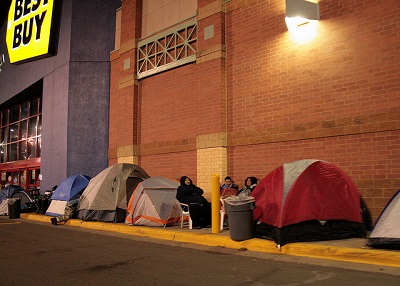
Truthout is a vital news source and a living history of political struggle. If you think our work is valuable, support us with a donation of any size.
After filling up on turkey and stuffing, millions of Americans flocked to some of the nation’s biggest retailers this year for Black Friday savings.
They stood in line for hours for a chance to grab deals like $199 for a 50-inch HDTV, or $29 for a seven-inch Android tablet.
But the millions lining up for bargain deals on the latest electronics isn’t a good thing. It’s a sign of the deterioration of the United States.
See more news and opinion from Thom Hartmann at Truthout here.
Every time a line wraps around a building on Black Friday, it’s a sign of the bad things happening in the US.
Every time hysterical people start yelling at each other over a flat-screen TV deal on Black Friday, it’s a bad sign for the US.
And, every time a stampede breaks out when store doors open on Black Friday, it’s a bad sign for the US.
As Alan Pyke points out over at the ThinkProgress blog,
“For millions of low-income and middle-class families, the day’s deals are a necessity not a luxury. Wages have stagnated for working families since the turn of the century, producing a ‘lost decade’ for working people’s quality of life. The slow recovery from the Great Recession has been driven mostly by low-wage job growth rather than by a resurgence in the kinds of jobs that provide enough headroom for a family to treat Black Friday as optional.”
So, just how bad has it gotten for working-class Americans?
Well, it’s gotten so bad that the American Dream is now pretty much officially dead.
That’s according to Gregory Clark, a researcher at the University of California-Davis, who found that social mobility, one of the bedrocks of the American Dream, is at historic lows.
Clark told KOVR-TV that, “America has no higher rate of social mobility than medieval England or pre-industrial Sweden. That’s the most difficult part of talking about social mobility, is because it is shattering people’s dreams.”
The speed with which Reaganomics and Clinton’s free trade policies have pushed the decline of the US middle class is truly startling.
For example, a study by the Russell Sage Foundation found that the inflation-adjusted net worth for the typical household was $87,992 in 2003. Just 10 years later, it was only $56,335.
Similarly, median household income has fallen by nearly 8 percent since 2000, and, according to the US Census Bureau, the middle class is taking home a smaller share of overall income in the US than ever before.
One of the reasons for that is because good jobs and good wages have disappeared.
According to the New America Foundation, back in 1980 less than 30 percent of all jobs in the US were low-income jobs. Today, over 40 percent of all jobs in the US are low-income jobs.
Meanwhile, 60 percent of the jobs lost during the Great Recession were mid-wage jobs, but they’ve been replace with low-wage jobs – 58 percent of the jobs created in the recovery have been these typically service-sector low-wage jobs.
The bottom line here is that we no longer have an economy that can support a middle class. We have an economy that works only for the wealthy elite.
And, despite what you might hear on the news, long lines on Black Friday aren’t something we should celebrate or cheer on like a spectator sport. They’re a tragedy.
They’re ongoing and irrefutable proof that millions and millions of Americans are struggling to survive and provide for their families, while finding the American Dream has become, since Reagan, increasingly harder, if not impossible, to achieve.
Over the past 34 years, our economy has changed from one that works for all to one that only serves the richest few, and that needs to change.
We need to bring back a US economy that works for everyone, and that starts by repealing the Reagan tax cuts, bringing back our unions and getting rid of so-called free trade deals.
Only then will all Americans have an equal shot at success.
A terrifying moment. We appeal for your support.
In the last weeks, we have witnessed an authoritarian assault on communities in Minnesota and across the nation.
The need for truthful, grassroots reporting is urgent at this cataclysmic historical moment. Yet, Trump-aligned billionaires and other allies have taken over many legacy media outlets — the culmination of a decades-long campaign to place control of the narrative into the hands of the political right.
We refuse to let Trump’s blatant propaganda machine go unchecked. Untethered to corporate ownership or advertisers, Truthout remains fearless in our reporting and our determination to use journalism as a tool for justice.
But we need your help just to fund our basic expenses. Over 80 percent of Truthout’s funding comes from small individual donations from our community of readers, and over a third of our total budget is supported by recurring monthly donors.
Truthout has launched a fundraiser, and we have a goal to add 231 new monthly donors in the next 48 hours. Whether you can make a small monthly donation or a larger one-time gift, Truthout only works with your support.